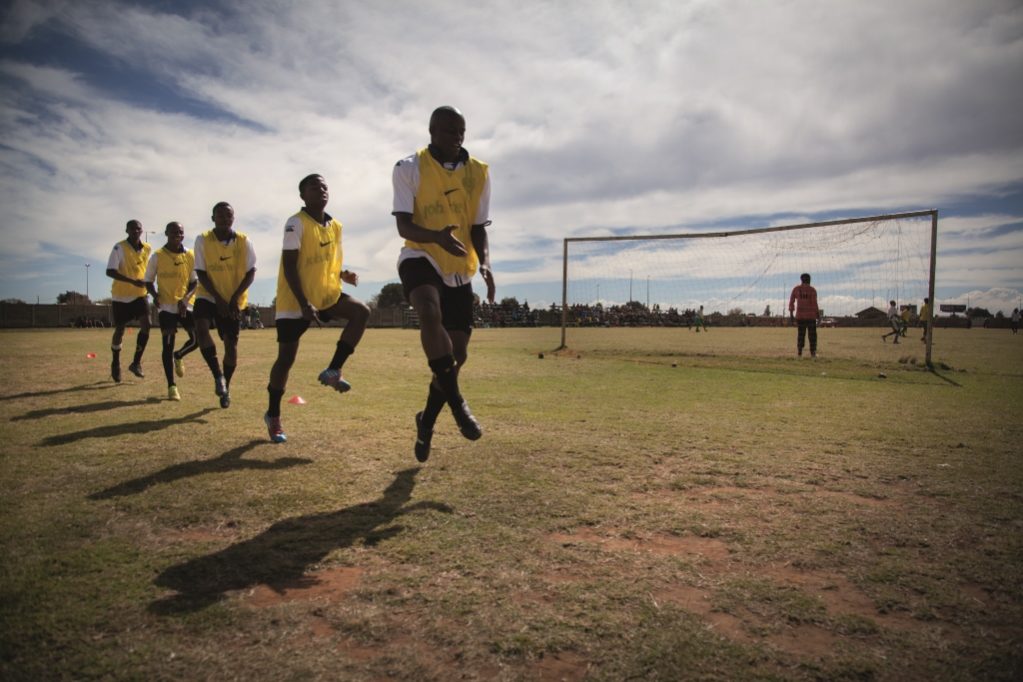The goalkick sends the ball swirling into the air. It rises far into The Birds Football Club’s half. Almost a hundred spectators cheer as it plummets earthwards.
The wind picks up as two players jump for the ball. Instead of a graceful header, there is the ungraceful crunch of heads. The players land in a heap. The ball soars over. The crowd collectively grasp their own heads screaming ‘Eiiiisshhhh’. The Birds’ coach gets up, walks up to the crumpled players, shows them to the bench and then tells the referee to get on with it.
It’s been a tough afternoon for The Birds. Nothing seems to be going their way. The pitch is bumpy. Wind sprays red dirt in their eyes. The wind also pulls at the nets every now and then, forcing the goalkeepers to put it back into place.

The match didn’t look good before a ball was kicked. The Birds got lost trying to find the ground. It’s not your usual football pitch. The field is squeezed at the back of a shopping plaza, between a taxi rank and a pen that has sheep, goats and a cow eating rubbish.
Loading...
This is The Scientists Football Club home ground in Sebokeng, 60 kilometers from Johannesburg, and as far from the World Cup as you can get. But it’s football crazy. Hundreds watch teams they don’t even know. For the band of gangly high school hopefuls of The Birds, it’s just another game in the SAB League, the third tier of South African football.
Before the Birds saw their coach on the touchline, they saw him on television. Aaron Mokoena is the former captain of South Africa. Sebokeng is a far cry from the lush green grass of Soccer City where Mokoena led Bafana Bafana in the 2010 World Cup. You could argue he’s light years away from Blackburn Rovers and Portsmouth where he was making £10,000 ($17,000) a week in the English Premier League. Now the man known as Mbazo needs his cutting edge to inspire The Birds on a field that’s more dust than grass.
“Guys, we have 45 minutes left. What do we do when we don’t have the ball? Put pressure. What do we do when we have it? Keep it… and have fun,” says Mokoena.
It was on even dustier pitches where Mokoena learnt to kick a ball. He grew up playing in Boipatong, 13 kilometers from Sebokeng, until Jomo Sono, another African footballer who made his fortune overseas, spotted him and convinced him to play for Jomo Cosmos. Mokoena then went to Ajax’s youth academy in Amsterdam after a grueling stint with African youth teams. Now he’s trying to do the same for others.
“I grew up here, and now it’s my chance to pay back the people who spotted me when I was young. I have had a side here for a number of years, but now I have the time to help develop them personally. There is so much talent here and it’s my goal to help local development feed into the provincial system. If I could make it to where I got, I don’t see why I can’t help these boys get there. Sometimes you just need someone with a name to talk to the right people,” says Mokoena.
The coach also runs two other development academies; one in South Africa, the other in Britain. Until a few months ago, Mokoena couldn’t even imagine being a coach.
“When I would tour with teams I could never see myself in that position. Now I see that my experiences on the pitch are so valuable as a coach. You can’t beat that experience,” he says.
Mokoena has got plenty of it. From the age of 18 he was playing for South Africa. He also holds the record for the most Bafana Bafana appearances at 107, 63 of them as captain.
He might not hold many coaching accolades as yet, but he is set to change that. Mokoena has pinned his hopes on a few hopefuls in an amateur side to get there. One could say it’s a small step for Mokoena but a long flight for The Birds.
Loading...
